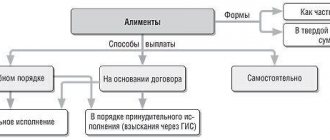Collection of alimony by court decision
An analysis of these articles shows that the list of persons who have the right to demand the collection of alimony is quite wide. The right to demand the collection of alimony corresponds with the obligation of family members to support certain categories of persons who are family members. In particular, the following have the right to collect alimony:
-parent of a minor child - from the other parent (Article 80 of the RF IC);
- guardianship and trusteeship authority for the parents (parent) of a minor child (Article 80 of the RF IC). It is necessary to stipulate that the guardianship and trusteeship authority has the right to bring a claim for the collection of alimony only if there is no agreement between the parents on the payment of alimony, maintenance is not provided to minor children and a claim is not brought to court for the collection of alimony;
-disabled adult children in need of help - from their parents (Article 85 of the RF IC). As the Plenum of the Supreme Court of the Russian Federation indicated in Resolution No. 9 of October 25, 1996 “On the application by courts of the Family Code of the Russian Federation when considering cases of establishing paternity and the collection of alimony,” claims for the collection of alimony for disabled adult children in need of help can be brought by adults themselves, and if they are recognized as legally incompetent in accordance with the procedure established by law, by persons appointed as their guardians (clause 17 of the Resolution);
-disabled parents in need of help - from their able-bodied adult children (Article 87 of the RF IC);
-disabled needy spouse - from his spouse (Article 89 of the RF IC);
- a wife during pregnancy and for three years from the date of birth of a common child - from her spouse (Article 89 of the RF IC);
- a needy spouse caring for a common disabled child until the child reaches the age of eighteen or for a common child who has been disabled since childhood of group I with his spouse (Article 89 of the RF IC);
- ex-wife during pregnancy and for three years from the date of birth of a common child - from the former spouse (Article 90 of the RF IC);
· a needy ex-spouse caring for a common disabled child until the child reaches the age of eighteen or a common child who has been disabled since childhood of group I - from the ex-spouse (Article 90 of the RF IC);
· a disabled, needy ex-spouse who became disabled before the dissolution of the marriage or within a year from the date of dissolution of the marriage - from the former spouse (Article 90 of the RF IC);
· a needy spouse who has reached retirement age no later than five years from the date of divorce, if the spouses have been married for a long time - from the former spouse (Article 90 of the RF IC);
· minor brothers and sisters in need of help, if it is impossible to receive maintenance from their parents, have the right to receive alimony in court from their able-bodied adult brothers and sisters who have the necessary means for this (Article 93 of the RF IC);
· disabled adult brothers and sisters in need of help, if they cannot receive support from their able-bodied adult children, spouses (former spouses) or from parents. They have the right to receive alimony from their able-bodied adult brothers and sisters in court (Article 93 of the RF IC);
·minor grandchildren in need of help, if it is impossible to receive maintenance from their parents, have the right to receive alimony in court from their grandparents who have the necessary means for this (Article 94 of the RF IC);
· adult, disabled grandchildren in need of help, if it is impossible to receive maintenance from their spouses (former spouses) or from their parents, have the right to receive alimony in court from their grandparents who have the necessary means for this (Article 94 of the RF IC) ;
·disabled grandparents in need of help, if they are unable to receive maintenance from their adult able-bodied children or from their spouse (ex-spouse), have the right to demand in court to receive alimony from their able-bodied adult grandchildren who have the necessary means for this (Art. 95 RF IC);
· disabled needy persons who actually raised and supported minor children have the right to demand in court the provision of maintenance from their able-bodied pupils who have reached the age of majority, if they cannot receive maintenance from their adult able-bodied children or from spouses (former spouses) (Art. 96 RF IC). Paragraph 2 of Article 96 of the RF IC provides that the court has the right to release pupils from the obligation to support actual educators if the latter supported and educated them for less than five years, and also if they supported and educated their pupils in an improper manner;
·disabled stepfathers and stepmothers in need of help, who raised and supported their stepsons or stepdaughters, have the right to demand in court the provision of maintenance from able-bodied adult stepchildren or stepdaughters who have the necessary means for this, if they cannot receive maintenance from their adult able-bodied children or from spouses (former spouses). The court has the right to release stepsons and stepdaughters from the obligation to support their stepfather or stepmother if the latter raised and supported them for less than five years, and also if they fulfilled their duties in raising or maintaining stepsons and stepdaughters in an improper manner (Article 97 of the RF IC). Please note that in some cases the collection of alimony may be refused by the court. In particular, in accordance with paragraph 2 of Article 119 of the Family Code of the Russian Federation, the court has the right to refuse to collect alimony from an adult capable person if it is established that he has committed an intentional crime against the person obligated to pay alimony or in the event of unworthy behavior of an adult capable person in the family. The Supreme Court of the Russian Federation in Resolution of the Plenum of October 25, 1996 No. 9 “On the application by courts of the Family Code of the Russian Federation when considering cases of establishing paternity and collecting alimony” clarified the questions that arise for the courts, what behavior of an adult capable person in the family should be understood as unworthy ( paragraph 20 of the Resolution). If, when considering a case on recovery of funds for the maintenance of an adult capable person, it is established that the plaintiff committed an intentional crime against the defendant or there is evidence of the plaintiff’s unworthy behavior in the family (former family), the court, in accordance with paragraph 2 of Art. 119 of the RF IC has the right to refuse to collect alimony. A crime, the commission of which may be grounds for refusal of a claim, should be understood as any intentional crime against life, health, freedom, honor and dignity, sexual integrity, other rights of the defendant, as well as against his property, which must be confirmed to have entered into legal force court verdict. In particular, the plaintiff’s abuse of alcohol or drugs, cruel treatment of family members, and other immoral behavior in the family (former family) can be considered as unworthy behavior that can serve as a basis for refusal to collect alimony. When considering cases of this category, it is necessary to take into account when an intentional crime was committed or there were facts of inappropriate behavior in the family, the nature, severity and consequences of their commission, as well as the further behavior of the plaintiff. The circumstances listed in paragraph 2 of Article 119 of the Family Code of the Russian Federation may also serve as the basis for satisfying the requirement for exemption from further payment of alimony imposed by the court on adults with legal capacity.
Payment amount
The amount of money that must be paid is an individual matter. Article 83 of the Russian legislator regulates the solution to this problem.
According to the letter of the law, the amount of payments in hard currency is provided for in each case separately by a specific court decision. The court proceeds from the maximum capabilities of the payer and the recipient to maintain the previous level of maintenance.
In articles 80, , 83, spouses will be able to find a lot of useful information on this issue. If you also work with the comments, you will find a lot of useful material. It is extremely important to pay attention in time to the fact that the distribution of alimony also depends on who the children stay with after the divorce. An interesting nuance is that in the case of the division of joint children between parents (when a child remains with each spouse), the amount of payments for the benefit of one of them, who has financial difficulties, will be determined exclusively by a fixed amount. These circumstances contribute to the fact that funds are collected every month in a specific amount.
Article 83 of the Family Code of the Russian Federation
Alimony provided by one able-bodied relative to a needy close relative can be withheld from the payer’s income in various forms - a percentage of monthly profit, at the expense of rights to property, with the help of food products, as well as in a fixed amount of money.
Since the last type of alimony payments is the most popular, we suggest focusing on it. Material compensation, which is paid in solid form, is discussed in article number 83, located in the Family Code of the Russian Federation.
It should be noted that the law number 83 of the RF IC is devoted specifically to alimony financial assistance, which should be provided to minor children. Therefore, those individuals who deal with alimony for spouses, parents, grandparents, brothers/sisters should not use this legislative act.
When is alimony paid in a fixed form?
The first part of Article 83 of the RF IC states that if the mother and father of a child who is entitled to monthly alimony payments from one of the parents do not enter into an agreement regulating this procedure, then compensation must be withheld in the form of a fixed sum of money. In other words, a certain amount of alimony is simply fixed, and every month the same amount is collected from the payer’s profit.
However, in some situations directly related to the payer’s earnings, even when drawing up an agreement with the recipient, it is impossible to provide alimony as a percentage or other forms of payments other than a fixed monetary amount. Compensation benefits for a child under eighteen years of age are paid in a fixed amount if the income of the parent acting as the payer meets one or more criteria:
- Irregularity and instability. Many professions imply that wages depend on the seasons, the financial situation in the country and/or the world, as well as on any other important circumstances. If the alimony payer does not receive his earnings all year round, but in certain months, or earns money monthly, but in different amounts, then he must support his child exclusively with the help of payments provided in a fixed amount.
- Earnings are paid in kind or not in rubles. Also, in the case of non-standard payments to an individual for his work, for example, such as in kind, alimony will be collected from him, which is necessary in order to provide for his son/daughter, in a fixed amount. The same applies to situations where the salary of a parent who must provide alimony is received not in the national currency of the Russian Federation, but in foreign banknotes.
- Lack of income. If an individual who has alimony obligations to his minor child has neither wages nor additional sources of income, then he will have to pay the benefit in a fixed amount, which will be calculated based on the subsistence level established in the territory of the Russian Federation.
- Other reasons. It also happens that none of the above points characterize the earnings of a potential payer, but it is still quite incorrect to withhold alimony from him in the form of interest for some reason. Then the judge needs to be informed about the factors that determine the recovery of compensation in a fixed form. After this, the court will establish a specific amount of alimony payments. This will also be done if allocating a certain share of the parent’s earnings to support the child is difficult or completely impossible.
Attention! If the income of an individual meets the above criteria not completely, but partially, then the provision of alimony as a percentage will be considered incorrect. In such a situation, compensation must also be withheld in a firm form.
The nuances of this procedure
It may also happen that when determining the size of the share that should be deducted from the salary, as well as other profits of an individual for the maintenance of minor children, either his or the recipient’s interests will be violated. In such situations, you need to argue for what reasons the court should order payments in a fixed amount, and it is advisable to document your arguments.
The Family Code contains article number 81, which states how alimony benefits are withheld from individuals in a shared ratio to provide for a child who has not yet turned eighteen years old. In some cases, the judge, when making a decision regarding the form of alimony, takes as a basis both Article 81 of the RF IC and Article 83 of the same code. In other words, monetary compensation is collected simultaneously in both forms - a percentage of earnings + a fixed amount.
Claim for spousal support
In this section of the article I present to your attention my sample application for spousal support.
I am showing it to you only in terms of volume. This claim for spousal support is 100% effective and has been perfected over the years of my judicial practice.
+7
Many wives (ex-wives) believe that cases for the collection of alimony for spousal support are winning.
Nothing like this? if a professional works on the defendant’s side. Further, using one of the examples, you will clearly see how important it is to enlist the support of a professional in this matter, instead of using crooked claim templates scattered on the Internet. So, read on.








